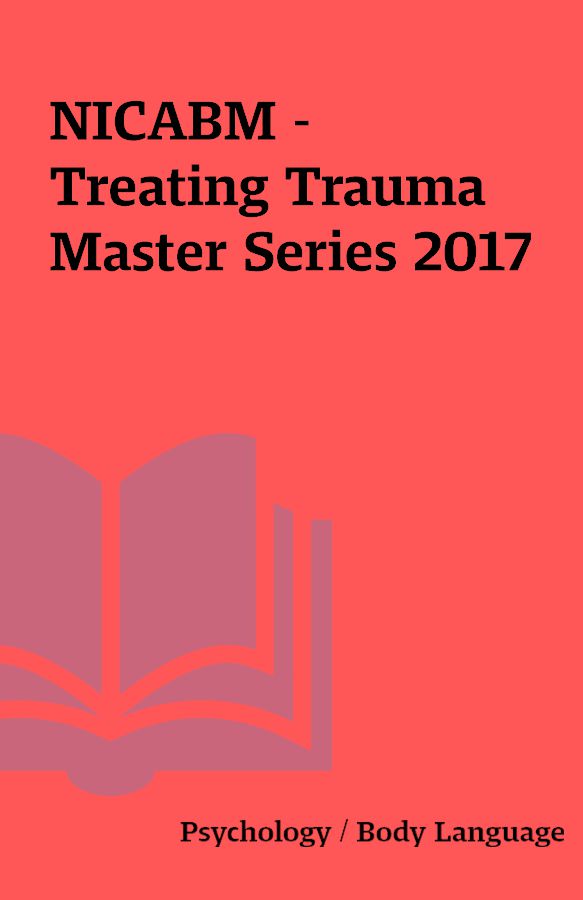NICABM – Treating Trauma Master Series 2017
nicabm – Treating Trauma Master Series 2017
[WebRip – 19 MP4, 19 MP3, 27PDF]
Description
**** elib.tech Exclusive **** This is the result of a Group Buysharing elsewhere will result in being banned!Master Strategies in theTreatment of TraumaThe Latest Interventions Can Reduce Symptoms and Speed HealingThe way we understand how trauma affects the brain and body has changed a lot in the last several years . . .. . . and that has given us new strategies to help our clients heal.We now have deeper insights into the nature of traumathat simply didn’t exist, even a short time ago.You see, when we look back, there are a lot of things about the treatment of trauma that seemed intuitive to us but we had no science to back them up.In addition, there were other things that felt intuitive, but that turned out just not to be true.But now, we have that science . . .Researchers studying trauma can now showwhat actually happens – in the brain and in ournervous system – during and after a traumatic event.And understanding the role of the brain and nervous system can bring depth and power to our interventions.It allows us to resource our clients with skills to stabilize, ground, and short-circuit old patterns of reactivity.Using what we’re now learning can help our clients calm their nervous system, process traumatic memories, and start to practice the essential skill of self-regulation.And when we’re able to help clientsrewire the trauma response and foster healthier integration, it canhave a profound effect on healing.Trauma is complicated and nuanced. But promising clinical research and evidence-backed strategies can lead our practice in new directions.That’s why we’ve developed an advanced program that gathers all the latest information on the treatment of trauma . . .. . . and we’re calling all practitioners, all over the world, to join us for the next five weeks as we focus on the latest findings on trauma and its treatment.Introducing the Treating Trauma Master SeriesThe Neurobiology of Trauma – What’s Going On In the Brain When Someone Experiences Trauma? How to Prevent Dissociation and Rewire a Client’s Reaction to Trauma The Hormonal Response to Trauma and How It Affects Brain Function The Part of the Brain That Activates the Freeze Response How to Help Clients Process Traumatic Memory That’s Stuck in the Body Epigenetics and Trauma: How Trauma Affects Gene Expression The Two Hormones That Disrupt Memory During Traumatic Events How Trauma Can Affect the Body’s Vulnerability to Inflammatory DiseaseHow to Work with Traumatic Memory That Is embedded in the Nervous System How the Nervous System Gets Tricked into Thinking Trauma Is Happening in the Present How to Help Clients “Unlearn” Their Nervous System’s Response to Trauma The Problem with Focusing on a Client’s Traumatic History What Can Go Wrong When We’re Helping a Client Come Out of a Dissociated State How Trauma Derails the Time-Keeping Part of the Brain (and One Way to Bring It Back) The One Key Factor That Can Make Traumatic Memory Overwhelming (and How to Work with It)How to Help Clients Tolerate Dysregulation and Come Back From Hypoarousal The Critical Difference in the Brain Between Processing Trauma and Reliving Trauma How to Bring a Client Back from a State of Hypoarousal How to Help Clients Calm Their Bodies and Reengage the Thinking Brain How to Know Whether a Client’s Dysregulation Is a Symptom of Bipolar Disorder or Trauma How to Help Clients Tolerate Distress After Trauma What Happens in the Body During HypoarousalHow to Work with the Limbic System to Reverse the Physiological Imprint of Trauma How to Tell When Talk Therapy Could Be Keeping Your Client Stuck in Trauma How to Use Movement to Help A Client’s Body “Unlearn” Its Adaptations to Trauma Why Targeting the Limbic System Can Make Our Interventions More Effective What to Look for in a Traumatized Client’s “Movement Vocabulary” One Key Approach to Use with Clients Who Are Unable to Verbalize Their Trauma How to Use Limbic System Therapy to Reverse Feelings of Powerlessness After Trauma How Past Trauma Can Hurt a Client’s Ability to Protect Themselves from Future Trauma (and How to Break the Cycle)The Neurobiology of Attachment The Common Brain “Bias” That Could Lead to Misattunement with Your Client How to Help a Client Stay Emotionally Connected – Even When They’re Dysregulated One Powerful Workaround for Fostering Secure Attachment with a Client Who Has Never Felt Safe with Another Person How to Sidestep the “Safety Miscue” That Often Comes Up with Traumatized Clients What Part of the Brain Develops First (and Why That Is So Important When It Comes to Trauma) The Latest Developments in How a Mother’s Trauma Impacts the Developing Baby in Utero Why Connecting with the Right Brain is Key to RegulationRegister Here for a Gold Subscription for $397and get all of the video & audio recordings (so you can listen and watch whenever you want),as well as the transcripts and learning toolsWebsite: http://www.nicabm.com/treatingtrauma2017/store-info/?del=sto…Important Note About The product:It contains both the video and the audio version. Plus also some transcripts.This is the newest course on Trauma Treatment, done in October / November 2017. The videos were originally also streamed for free live, but no recording were available and no transcripts and no bonuses. So you could only see the videos by singing up to the live stream and then logging on when it was live. Only paid members (gold members) could re-watch the videos.So this is just that – the complete (gold) paid course that includes all the recordings and the cheat sheets and bonuses.GB thread: here
You must be logged in to post a review.






Reviews
There are no reviews yet.